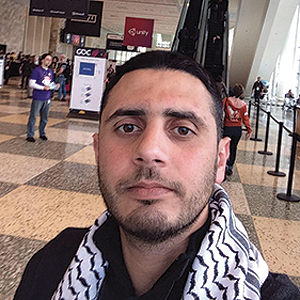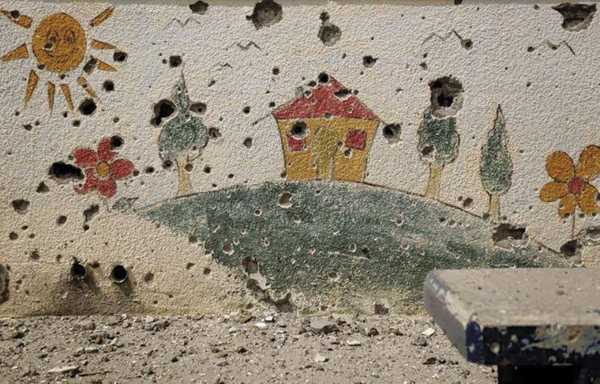If you think that the situation in Gaza or in Palestine in general will be solved soon, I believe you are mistaken. I have no idea how we have been able to develop a way to survive in the midst of injustice, discrimination, and occupation.
In 2014, there was another war on Gaza, but this time it was different. The number of civilians killed was huge, and people were especially shocked by how many children were killed. It was a massacre. Sure, this is not the first massacre that we have had to face as Palestinians; there have been many. But seeing how global media presented this war, I knew on which side they stood. I could not understand the world’s silence and inaction in the face of the ongoing atrocities, and I felt that we were facing some sort of brainwashing machine.
For me, this war was more difficult because my perspective had changed. I had become a father, and I began to observe things based on that perspective. Now, when I see a father carrying the lifeless body of his son or daughter, I always think, “What if this had happened to me?”
I still have no answer to that question. But I knew that I had to do something, something effective; something that would allow me to share my deepest feelings and emotions. And being a game designer, I knew that I had to create a game – even though many people would not understand my decision. They might say: There are people dying here, and you are thinking about games? Do something more useful to help.
♦ Games are the best medium for sharing stories because they give players a chance to experience the feelings that come up in certain situations.
But I went ahead and created a game because I believe that games are an element of culture, a type of media, and we can share any story by using games. Like movies, songs, art, or books, games can be a source of information. But they are not like any other medium: In movies, you watch the hero; in books, you read about the hero; but in games, you are the hero. In games, you are not merely a viewer. You take action, you can change the flow of the game by making decisions, you write your own story – even if only in a virtual world. Your brain will blur the lines between the virtual and the actual world; this is why many people get totally engaged in games and why gamers enjoy talking about their stories and reveling in how they accomplished their missions.
So I decided to create a game called Liyla and the Shadows of War. It is a game based on actual events: It tells the story of a little girl who lives in Gaza during the war of 2014. I worked for 20 months with a team of volunteers to develop this game. When we were ready for the release, we received a punch in the face when the App Store team rejected our game. They claimed that it makes a political statement and should be removed from the games category and placed under news.
I had worked long hours on this game to describe the suffering of the Palestinians. I had created it as an act to express our humanity. I considered its rejection to be discrimination and part of the misrepresentation that Palestinians are exposed to on a global level. When I talked about this experience in public, I received support via social media from many people around the world. And when important sites such as the Guardian and the New York Times began to pay attention, the App Store team decided to accept the game as a game.
One year after the release of Liyla, it has been downloaded more than 800,000 times. Liyla has been featured in events in Croatia, Singapore, Germany, Italy, Spain, Finland, South Africa, Canada, and Jordan. It has been nominated for a number of awards, three of which it won, and I was invited to give a talk about Liyla at GDC, the largest conference for game developers around the world, where I received an unbelievable amount of support from the audience. I am convinced that I received this support as a representative of the Palestinian people, especially the people of Gaza.
With 800,000 downloads, the total gameplay time of Liyla amounts to about 21 years. I would never have been able to talk about Palestine that much without Liyla, The Game!
» Rasheed Abueideh is an entrepreneur, game designer, and traveler. Liyla and the Shadows of War is available online, free of charge.




